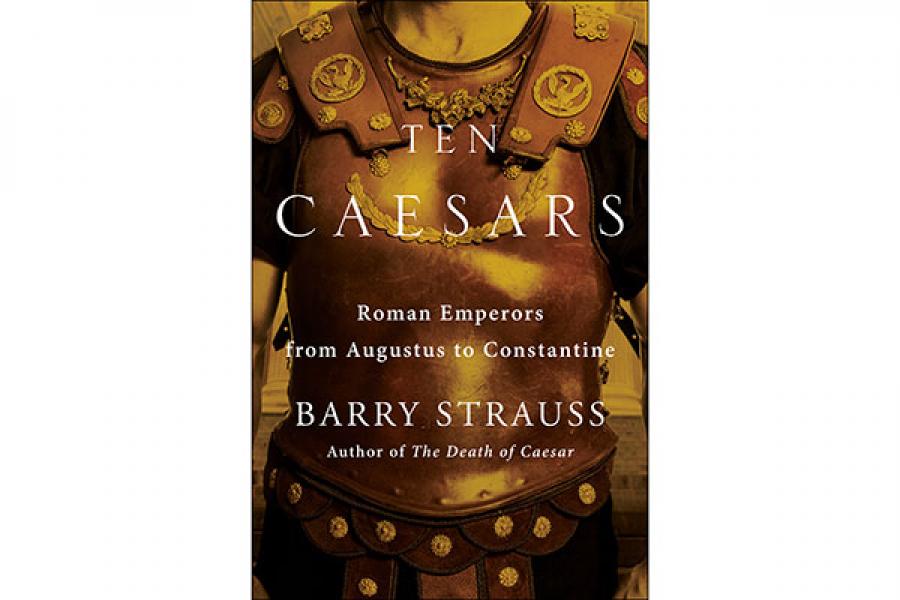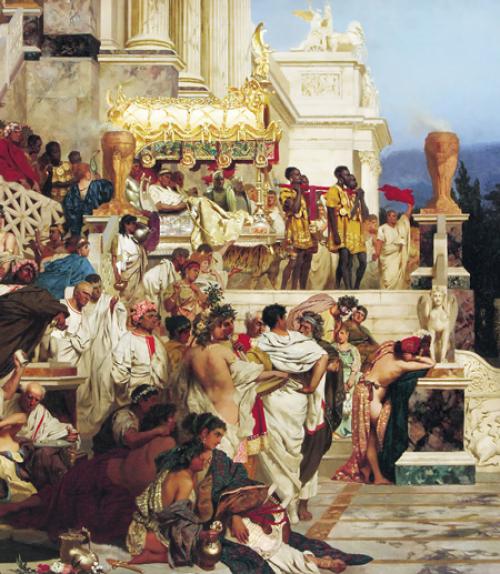Stepping into the shoes of a god isn’t easy, as historian Barry Strauss makes dramatically clear in a new book that traces the biographies of 10 of the men who succeeded Julius Caesar, deified by the Roman Senate.
But megalomania may have been an asset as well as the defining characteristic of Rome’s emperors. In “Ten Caesars: Roman Emperors From Augustus to Constantine,” Strauss details the intense ambition, clever strategies and human failings of 10 of history’s most famous men – and the women who advised, tempted and betrayed them.
Julius Caesar’s immediate heir, Octavian – who was just 19 when his mentor was murdered – wasted no time in claiming “all the power and glory of Rome’s former dictator for life. Men have been sent to mental hospitals for less,” writes Strauss, the Bryce and Edith M. Bowmar Professor in Humanistic Studies in the College of Arts & Sciences.
Octavian treated the title of Caesar, Strauss writes, “like a talisman of power, as if it already had the weight of centuries behind it.”
Strauss’ fresh take on these ancient figures brings us close to them as people: Livia, ambitious for her son Tiberius, successor to Augustus; Tiberius himself, with a passion for astrology but who was “supposedly so stiff and stern that he came off as unpleasant.”
Nero, reviled among the emperors, “considered himself first and foremost an artist.” Then there was Hadrian, “a man’s man who owed his success to the women who loved him, but [who] gave his heart to an adolescent boy.”
The prologue begins with night on the Palatine Hill, where Strauss launches the reader on a journey of imagination: “It was here on the Palatine that Rome’s first emperor planted the flag of power and where, for centuries, most of his successors each ruled over fifty to sixty million people,” he writes. That sense of immediacy pervades the entire work; though they lived thousands of years ago, Strauss shows the resonance of their lives for today.
Augustus Caesar, for example, “ran his regime like a family business.” Constantine’s “staggering ambition was matched only by his genius at self-preservation.” While the violence of these emperors can seem appalling to modern sensibilities – they routinely killed their own children and other relatives in addition to their enemies – their manipulation of public opinion and clever political strategies have been imitated throughout history.
“Even today, these emperors are admired by leaders in business and politics,” says Strauss. “But it’s important to distinguish which aspects of their careers should be emulated, and which led to disaster.”
Despite Roman society being male-centered and what many today would term misogynistic, women had tremendous influence on its politics, says Strauss. “We need to understand ancient Romans in the context of their own society and culture,” he says. “Their values are not the same as ours.”
How these Roman emperors dealt with immigration, Strauss says, also has lessons to teach: “While some in the old elite sneered at immigrants, the Caesars welcomed them and exploited their talents. They knew that, in order to thrive, Rome had to embrace change. Only by accepting new people could Rome preserve the core of its old ways. So, emperors came not only from Rome or Italy but from Spain, North Africa, Syria and the Balkans. Rome became the most diverse city in the world, in many ways as much a Greek city as a Latin one, and with large Celtic, Egyptian, German and Jewish populations as well.”
Extensively researched, “Ten Caesars” follows Strauss’ “The Death of Caesar: The Story of History’s Most Famous Assassination,” an in-depth look at the rise and fall of Julius Caesar. An expert on ancient military history, Strauss’ other books include “Masters of Command: Alexander, Hannibal, Caesar and the Genius of Leadership” and “Battle of Salamis: The Naval Encounter That Saved Greece – and Western Civilization.”
Reading, signing
Buffalo Street Books in Ithaca will host a book reading and signing of “Ten Caesars” with author Barry Strauss, March 7 at 5:30 p.m. Books will be available for purchase; the public is invited.
Image: Nero’s Torches by Henryk Siemiradzki, 1876
This article also appeared in the http://news.cornell.edu/stories/2019/03/ten-caesars-offers-lessons-historys-great-leadersCornell Chronicle.





